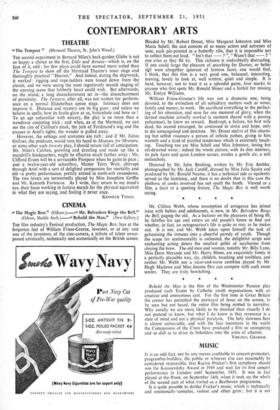CINIEIKA
a The Magic Box." (Odeon.)—" Mr. Belvedere Rings the Bell." (Odeon, Marble Arch.)--“Behold the Man." (New Gallery.)
THE film industry's Festival production, The Magic Box, lays at the forgotten feet of William Friese-Greene, inventor, or at any rate one of the inventors, of the cine-camera, a tribute of talent unsur- passed artistically, technically and numerically on the British screen.
Headed by Mr. Robert Donat, Miss Margaret Johnston and Miss Maria Schell, the cast consists of so many actors and actresses of note, each pin-pointed in a butterfly role, that it is impossible not to collect them out loud. " Isn't that — ? ", " Wasn't that —.7 " one cries as they flit by. This richness is undoubtedly distracting. If one could forgo the pleasure of searching for Dames, or better still were altogether ignorant of famous faces, one would find, I think, that this film is a very good one, balanced, interesting, moving, lovely to look at, well written, quiet and simple. It is hard, however, not to treat it as a splendid game, four marks to anyone who first spots Mr. Ronald Shiner and a forfeit for missing Mr. Emlyn Williams.
William Friese-Greene's life was not a dramatic one, being devoted, to the extinction of all subsidiary matters such as wives, family and money, to work. He sacrificed everything to the perfect- ing of his obsession, and save for one moment of glory, when the darned machine actually worked (a moment shared with a passing policeman), he knew no reward. Bankrupt, a failure, his first wife dead, his second estranged, he continued to strive and hope, only to die unrecognise,d and destitute. Mr. Donat makes of this charm- ing but selfish visionary a person of infinite pathos, giving to him warmth and a kind of puzzled tenderness which is extremely touch- ing. Touching too are Miss Schell and Miss Johnston, loving but oft-deserted wives ; indeed the whole picture, with its dim interiors, its pale faces and quiet London scenes, exudes a gentle air, a soft melancholy.
Directed by Mr. John Boulting, written by Mr. Eric Ambler, photographed by Mr. Jack Cardiff, dressed by Miss Julia Squire and produced by Mr. Ronald Neame, it has a technical side as opulently served as the histrionic, and there is no doubt that in this case the plethora of cooks involved has not spoilt the broth. Viewed as a film, a feast or a sporting fixture, The Magic Box is well worth seeing.
Mr. Clifton Webb, whose assumption of arrogance has joined issue with babies and adolescents, is now, in Mr. Belvedere Rings the Bell,.paging the old. As a lecturer on the pleasures of being 80, he falsifies his age and enters an old people's home to find out whether, in fact, an octogenarian's life is quite as rosy as he makes out. It is not, and Mr. Webb takes upon himself the task of galvanising the inmates into a cheerful parody of youth. Though the scope for sentimentality is unlimited, the delightful script and enchanting acting deters the smallest pellet of saccharine from cloying the brew. The old men and women, notably Mr. Billy Lynn, Miss Doro Merande and Mr. Harry Hines, are exquisitely funny in a perfectly plausible way, sly, childish, touching and toothless, and neither Mr. Webb nor a vicar-and-nurse combine played by Mr. Hugh Marlowe and Miss Joanne Dru can compete with such sweet seniles. They are truly bewitching.
*
Behold the Man is the film of the Westminster Passion play produced each Easter by Catholic youth organisations with an amateur and anonymous cast. For the first time in Great Britain the censor has permitted the portrayal of Jesus on the screen, to be seen but not heard, the entire film being mimed to narrative. Why aurally we are more. likely to be shocked than visually I do not pretend to know, but what I do know is that reverence is a state of mind and not a physical paralysis. The holy slowness here is almost unbearable, and with the best intentions in the world the Companions of the Cross have produced a film so uninspiring and so dull as to drive its beholders into the arms of atheism.
VIRGINIA GRAHAM.


































 Previous page
Previous page